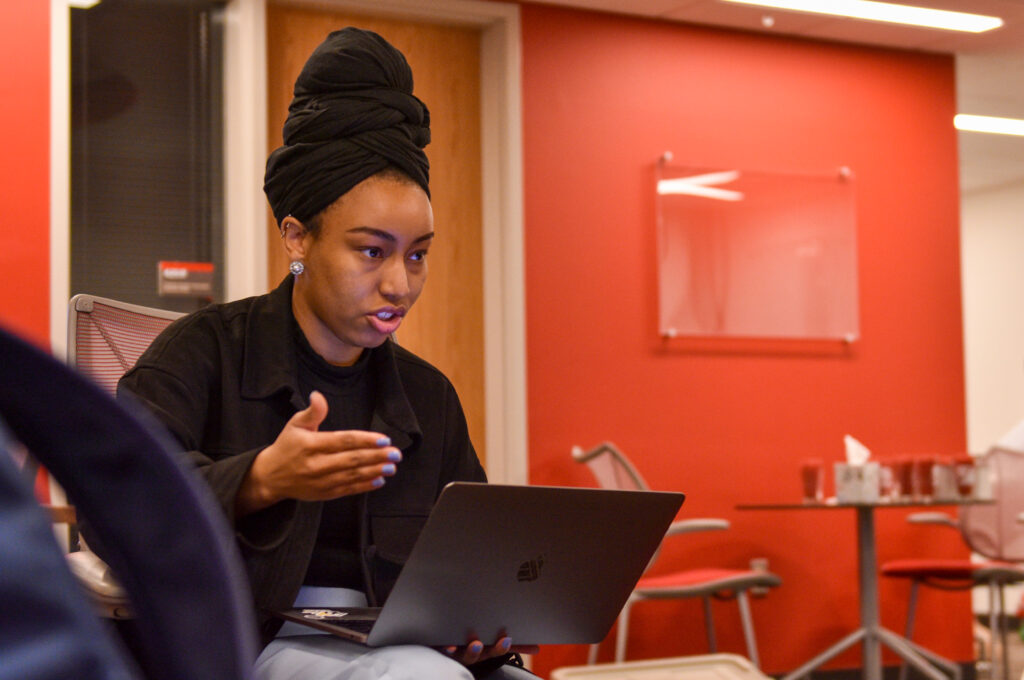There were a number of factual errors, grammar mistakes and poor stylistic choices in the article “Mental Health Initiatives at NC State: The Work of Chazzlyn Jackson” published in the Orientation Issue that we released this summer. Below is the corrected article and a list of the changes made to it.
We apologize for our bad journalism, especially at a time when credibility in news organizations is more important than ever. Policy changes have been implemented at Roundabout to ensure egregious mistakes like this do not occur in the future.
Here is the list of the corrections made:
- Changed “Student Government Mental Health Intervention” and “Student Senate’s Mental Health Task Force” to Select Student Body Department on Mental Health Intervention
- Changed “Mackenzie Heflin” to McKenzy Heavlin
- Edited quotes for clarity
- Fixed overly stretched or condensed text spacing
- Made the font consistent
- Fixed various grammar errors
Here is the corrected article:
Mental Health Initiatives at NC State: The Work of Chazzlyn Jackson

Chazzlyn Jackson, a graduate student studying Sociology, consults formal documents while answering questions regarding Student Government’s Department on Mental Health at Talley Student Union on Wednesday, March 29, 2023. Photo by Oscar Codes-Bodien
NC State has made tremendous strides in tackling mental wellness concerns among its student body, paving the way for a healthier and happier campus community. Mental health issues are prevalent among college students — more than 60% of college students met the criteria for at least one mental health problem in the 2020 to 2021 school year, according to the American Psychological Association (APA). These issues can have serious consequences, including decreased academic performance, an increased risk of dropping out and even suicide. Addressing mental health issues is critical to ensuring that students are able to reach their full potential and succeed in their academic and personal lives.
One of the foremost heroes driving these efforts on campus is Chazzlyn Jackson, a graduate student and student leader who has been instrumental in shaping the university’s approach to mental health. A number of initiatives have been implemented to help students navigate mental health challenges and access the resources they need to thrive, spearheaded by students like Jackson who are passionate about driving change and raising awareness about mental health issues.
Jackson played a vital role in two working groups related to mental health at NC State. The first one, the Select Student Body Department on Mental Health Intervention, was entirely student-led and focused on researching solutions for mental health issues among students. Jackson chaired this group. The second group was the Student Mental Health Task Force, which was created by the university and had heavy administrative involvement but still included student representation. Jackson was a graduate student representative on this task force.
Jackson’s work as chair of the Department on Mental Health Intervention involved organizing and ensuring the completion of the department’s responsibilities and making sure that the student voice and the student lens were utilized in approaching possible policy changes at the administrative level. Her main responsibility was to ensure that the department was aligned with the charge given by the student body president.
“He charged us to conduct research on mental health crises, suicide prevention measures implemented at other campuses and current best practices according to scientific literature to get a better understanding of student mental health needs. We then provided that research as recommendations to university organizations,” she explained.
Jackson organized the department’s work into two phases: an extensive literature review and focus groups. The literature review aimed to familiarize the department with the subject matter and ensure that they fact-checked their research. The focus groups, on the other hand, were focused on directly hearing from students. These discussions gave the team a chance to hear firsthand the desires, needs and experiences of students regarding their mental health. Jackson was responsible for facilitating three of the four focus groups, and she made sure that the students were comfortable and that the sessions were conducted sensitively.
“We had four focus groups that consisted of students ranging from first-years all the way to grads, and from plenty of different programs. We had snacks and lo-fi going on in the background; it was to make sure that our students were as comfortable as possible,” she said.
Jackson’s role also involved training members of the department on how to conduct research, keeping them informed of developments in the Student Mental Health Task Force and appointing other members to the department. There are currently several student government representatives working on the next step: implementing proposed mental health reforms.
“Our outgoing Student Body President, McKenzy Heavlin, was on the committee that created the actual implementation process for the Student Mental Health Task Force report. So they will be working over the summer, hopefully, and of course this fall, on actually implementing the recommendations from the report.”
Jackson plans next to focus on graduate student life and experiences as the newly elected Vice President of External Affairs for the Graduate Student Association (GSA). However, she is open to being tapped for further clarification or guidance throughout the implementation process.
Regarding that process, the mental health intervention group made a specific recommendation in their report that a department should be created to carry out their recommendations. Jackson prefers that it be either the vice president or the chief of staff who chairs it. She imagines herself visiting those meetings once they are created.
Jackson noted that the recommendations made by both the Student Mental Health Task Force and the Department on Mental Health Intervention are just that: recommendations. They are not requirements to be carried out. However, she is happy to see that many of their recommendations have already been executed and that a lot of implementation teams are taking action to address the crisis. The Mental Health Intervention department’s recommendations have a unique student lens to them since they were strictly student-led and created.
A “steering committee” oversees the implementation teams who’re carrying out the recommendations. The committee evaluates each idea, which can be a complex process. Given the varying scopes of the recommendations they consider, the timeline and speed of implementation are obstacles to be determined. Sometimes the committee looks into a recommendation and finds that it simply isn’t feasible.
“When we get into the language of requirements, especially requirements with faculty, it’s a whole different conversation,” Jackson said.
It will be interesting to see how these recommendations are brought to life and what kind of impact they have on the campus community.
Jackson has invested an incalculable amount of her time and effort into this work. But regardless of the difficulty, Jackson was meant to be a community leader.
“It’s always been a personal responsibility of mine to provide my service in the form of leadership. Connecting it to my identity as a Black woman in America, I feel that there are dues to be made,” she said. “If I have the resources and opportunity to lead and better serve marginalized communities that make up the broader community, then I’m going to do it, because that’s, to me, my personal responsibility.
“I’m a people person; I love working with people. And fortunately, that helps my job as an advocate and an activist. My ability to connect with others to form those relationships is what makes people trust me,” she continued. “People don’t trust leaders. We know why. There’s a repeated history and pattern of leadership letting us down or not being transparent. I want to change that narrative. And so when I had the ability to reestablish trust between marginalized communities — Black students, queer students — that meant a lot to me. And that’s motivation enough, because that gives our overall community hope that we can change for the better.”
Beyond any change the university can put in place, there are some steps that students themselves can take to promote their own mental health. Proper time management is one of those things. It can make the difference between a stress-free semester and severe burnout, but it can be so hard to figure out a system that works for you. What works for one person isn’t going to work for everybody, based on everyone’s unique hobbies, workload and limits. As Jackson emphasized, it will take time to figure out how you want to manage your time.
“First-year students have to get into the habit of making sure they’re enhancing their self-awareness skills and evaluating how they feel in all realms of being: emotionally, mentally, spiritually, physically and financially,” Jackson said. She went on to explain that it can be as simple of a process as the person wants, as long as they’re checking in with themselves regularly. “Something to get them in the habit of being self-aware and enhancing those skills, because those are transferable skills in any space that you walk in. And they’re also lifetime skills.”
I’ll leave you with Jackson’s departing words: “Something I like to say to my fellow peeps is to go be great.”
“The underlying meaning of that is for you to lead with confidence and believe in yourself,” she explained. “And greatness is also a spectrum. So if you cooked yourself breakfast today and that’s how you were great, high fives, claps and cheers to you. That’s beautiful.”
Jackson’s insight on the state of mental health resources at NC State is invaluable. She is one of the many members of the Wolfpack who are here for you as you begin your journey into higher education, and as you step onto campus in the fall, be sure to stay aware of the mental health resources available to you.

Photo by Oscar Codes-Bodien
